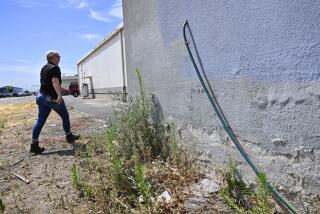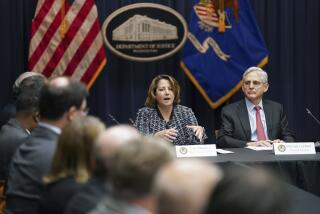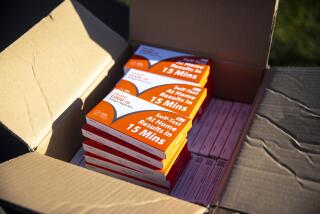An FDA-approved coronavirus home test kit? That’s false, L.A. authorities say
For just $40, the news release billed, you could prick your finger and in 15 minutes learn “with a specificity of 100%” whether you’d tested positive for COVID-19, the disease caused by the coronavirus. The “Corona Virus At-Home Test Kit” was approved by the U.S. Food and Drug Administration, its manufacturer trumpeted on Twitter.
Not so. Yikon Genomics, a Chinese company staffed by researchers from some of the country’s leading universities, agreed in a settlement with the Los Angeles city attorney’s office to pull its unauthorized product from the market and refund anyone who purchased it. City Atty. Mike Feuer will announce the settlement Monday morning.
As a pandemic sweeps across the United States, straining medical workers’ ability to test for the coronavirus, a mishmash of laboratories, entrepreneurs and outright charlatans have begun selling “home test kits” for COVID-19.
While the FDA says it wants to develop home testing for COVID-19 and is “actively working with test developers” to that end, as of Sunday, the agency has approved no such kits. Such unauthorized and potentially bogus tests put people at risk, the FDA says. If someone uses a defective test that returns a false negative, he or she could fail to seek treatment and unwittingly expose others to the virus.
Moreover, people are being swindled of their money, a deputy city attorney wrote in a complaint lodged against Yikon Genomics, alleging it violated, among other laws, California business codes that forbid false and misleading advertising.
“Whenever consumers are motivated in part by fears,” wrote the deputy, William R. Pletcher, “they are particularly vulnerable to fraudsters, scammers, and ‘snake oil’ hucksters and charlatans who prey on those fears to persuade the consumers to seek ‘cures,’ ‘treatments,’ and other protections, such as tests.”
While local and federal authorities have charged numerous alleged grifters with peddling fake cures and inoculations for the coronavirus — including one small-time actor and bodybuilder who advertised “coronavirus pills” on his public Instagram account with a 2.4 million followers — Yikon Genomics is no fly-by-night operation.
Based in China, Yikon Genomics registered a Foster City address in 2013 with the California secretary of state. Its director, according to state records, is Xiaoliang “Sunney” Xie, a professor of biophysical chemistry and dean of sciences at Peking University. Xie didn’t return an email seeking comment.
Brandon Hensinger, the company’s global vice president and a defendant in the city attorney’s complaint, said in an interview that Yikon Genomics had purchased the kits from a manufacturer in China, Dabo Pharmaceuticals, with the intention of distributing them in the United States.
Hensinger said he corresponded with the FDA, which initially told him Yikon Genomics could market the kits without first obtaining an Emergency Use Authorization. When that guidance changed, Hensinger said, the company promptly pulled its kits offline, canceled its orders and refunded customers.
“All of that coincided with the L.A. city attorney contacting us and telling us we were advertising a false product, which just wasn’t the case,” he said.
In a flurry of news releases and tweets, Yikon Genomics had said its fingerstick-style test could detect antibodies for the novel coronavirus with “a specificity of 100%.” The company falsely wrote on Twitter its kit was “FDA approved.”
“We hope that this test can improve the number of patients getting screened,” a news release quoted Hensinger as saying, “and also can provide peace of mind to people throughout the world.”
Yikon Genomics marketed the kits at $40 apiece or $2,000 for 100, according to its website, www.thecoronavirustestkit.com, which has since been taken down.
In a stipulation signed April 2, the company agreed to pull its kits from the market and remove its advertisements unless and until it obtained FDA authorization to sell the kits for use at home. No home test kits were delivered to customers, Hensinger said.
The demand for new, more accessible ways to test for the coronavirus has opened the door to unscrupulous actors, Hensinger acknowledged, even as he insisted his company wasn’t among them.
“Everybody’s really in a rush to bring tests to the market, and a lot of companies are making fake kits,” he said. “There are companies that are doing things illegally and improperly. But we followed all the processes to do this the right way. I want to emphasize: Our intention was, and is, really just trying to help people.”
More to Read
Start your day right
Sign up for Essential California for news, features and recommendations from the L.A. Times and beyond in your inbox six days a week.
You may occasionally receive promotional content from the Los Angeles Times.






